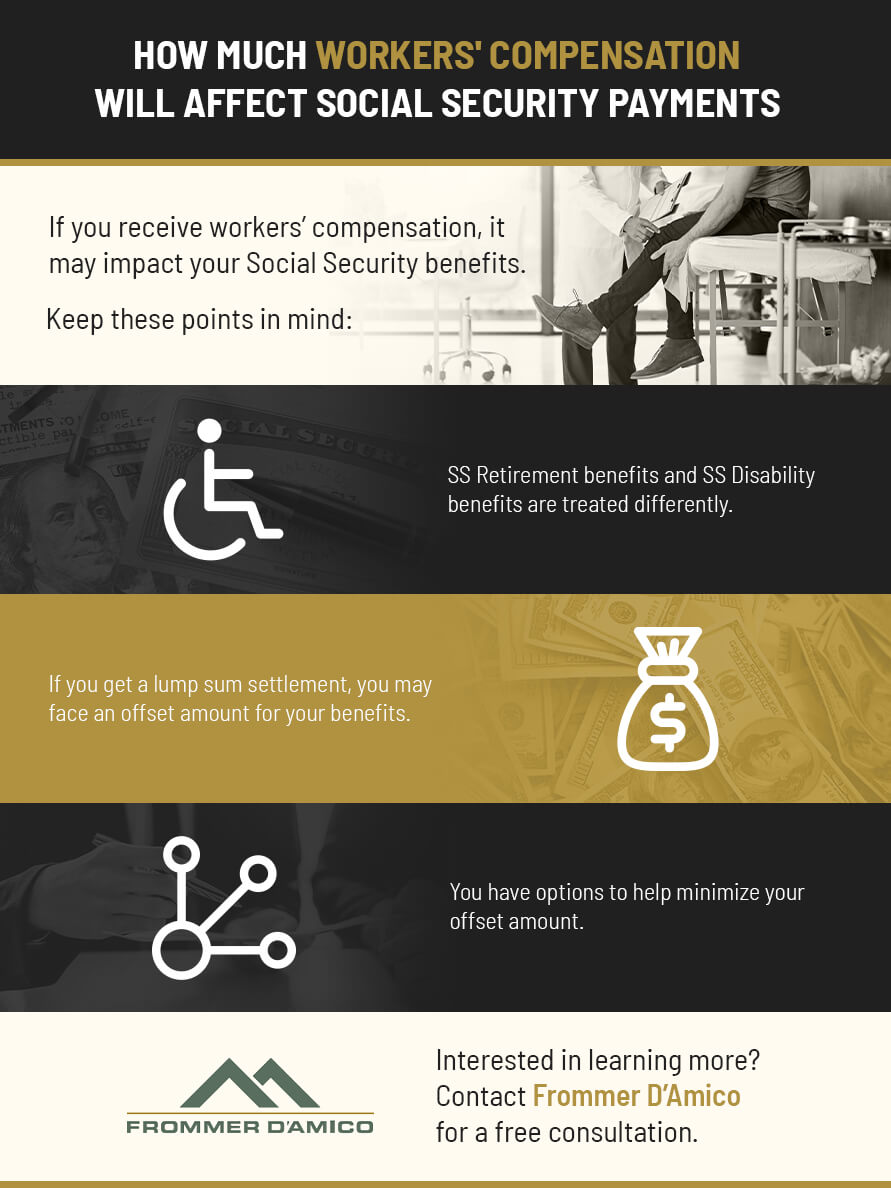Table of Contents
After sustaining a work injury, you may have questions about how to file a claim or what benefits you are eligible to receive. Many of our clients ask, does workers’ comp affect social security retirement benefits, and how these programs interact. This guide will help you understand the relationship between the two.
Employees can generally receive both workers’ compensation and Social Security benefits. However, you may not be able to receive each of these benefits in full. Following an amendment of the Pennsylvania Workers’ Compensation Act, Pennsylvania employers can reduce an injured employee’s workers’ comp benefits if they are also receiving pension benefits or Social Security benefits. This reduction is called an offset credit.
Before signing up to receive your Social Security benefits, you should be aware of what collecting Social Security retirement benefits could mean for the amount you will continue to receive from your workers’ compensation.
How Does Workers’ Comp Affect Social Security Retirement Benefits?
If you’ve been injured on the job in Pennsylvania or you have suffered a work-related illness, you may qualify for SSDI and workers’ comp in Pennsylvania. These are two different benefits programs. Depending on your injuries, you may also be covered by your medical coverage or other benefits. Understanding the differences between Social Security disability and workers’ comp programs can help you understand which can support you during your injury.
What Are the Differences Between Workers’ Compensation and SSDI Benefits?
Workers’ compensation and SSDI have several key differences, including:
Who administers the benefits: SSDI is run by the federal Social Security Administration (SSA), while workers’ compensation is a state program.
What these programs specifically address: Workers’ compensation offers medical benefits, wage-loss benefits and other reimbursements for work-related injuries and medical conditions from which you are expected to recover. Workers’ comp is meant to be a temporary benefit until you can get back to work. SSDI does not have to be work-related. You can receive Social Security disability benefits if you have been diagnosed with a condition not related to work or have been injured through some other cause that is expected to last longer than a year.
How the benefits are paid for: Workers’ compensation benefits are paid for by your employer. Your employer is required by state law to pay for insurance on your behalf through a competitive state fund like the State Workers’ Insurance Fund (SWIF) or a private insurance carrier, or employers can self-insure under Section 305 of the Workers’ Compensation Act. Another type of benefit is called Short Term Disability and Long Term Disability Insurance. Long-term disability benefits are paid by some employers, and other employers offer coverage through deductions on your paycheck through a dedicated payroll tax.
If you are not sure what type of benefits you qualify for, contact an attorney at Frommer D’Amico. Our team can explain whether you qualify and how you can navigate the benefits system. We can also work with you during the application process so you get the legal support you need.
Can You Get Social Security on Workers’ Comp?
Yes, you can collect workers’ comp and Social Security disability benefits at the same time in Pennsylvania. If you qualify for both, you should apply for both, but you will not get more than your current wages. The total amount you receive from workers’ compensation and SSDI benefits cannot be more than 80% of your income before your injury.
In many cases, workers find they don’t qualify for both SSDI and workers’ comp because SSDI is often meant for longer-term injuries while workers’ compensation is meant for more temporary injuries. If you would like to know if you qualify for SSDI, FMLA leave, workers’ compensation or other benefits, contact the certified workers’ compensation specialists at Frommer D’Amico.
How Long Will My Workers’ Comp and SSDI Benefits Last?
How long you can stay on workers’ comp depends on many factors. You are paid benefits or are qualified to get benefits until:
You can return to work at your pre-injury earnings.
You have recovered.
Your employer has proven its entitlement to a modification based upon your ability to work in the labor market.
You may also receive partial disability benefits for up to 500 weeks.
Social Security disability benefits can also last as long as your permanent injury does or until you reach retirement age. To find out how long you can expect to get benefits in your specific case, you may wish to consult with a workers’ compensation specialist.
Lump Sum Payment Adjustments
Injured workers can settle workers’ compensation claims like medical expense benefits through lump sum settlements. A lump sum settlement — a Compromise and Release agreement — is a one-time payment to replace the workers’ compensation checks, medical bills or both. This payment comes from the employer or the insurance company.
If you receive a lump sum settlement, you may face an offset amount for your benefits. Lump sum payments are based on the amount of workers’ compensation you were receiving every month. The amount should cover your current and future medical expenses, wage loss benefits, and other damages.
In Pennsylvania, an injured worker can apply for a commuted award. Commutation allows you to collect your benefits in a lump sum payment discounted to its present value without agreeing on a final full settlement. Under Pennsylvania law, future periodic payments can be commuted by the Workers’ Compensation Board. No discount is applied when the commuted amount of time is 52 weeks or less. When the commuted amount is being calculated for a time period of more than 52 weeks, then a discounted rate is usually applied. Keep in mind, commutations are rare. Instead, most cases settle through a Compromise & Release Agreement.
Before the agreement can be legally binding, a Compromise and Release Agreement (form LIBC-755) must be approved. This detailed form typically provides all the information required for an offset. Your settlement can be approved at a Compromise and Release hearing. A Compromise and Release Agreement is signed on the date of the hearing before being submitted for approval to the judge. For calculating the impact of the settlement on future social security disability benefits, an proration of the settlement is calculated. The settlement amount if basically divided by your life expectancy. The proration effective date for the lump sum is the day after the Compromise and Release Agreement was signed, unless the Compromise and Release Agreement specifically states an effective date.
If you accept a lump sum payment, you cannot receive any more money or pursue future claims from your employer’s insurance company. Before you agree to a settlement, talk with a workers’ comp attorney from Frommer D’Amico. An attorney can help answer questions about your case and aid in getting the compensation you deserve.
How Will My Employer Notify Me of a Workers’ Compensation Offset?
If you are approved for social security retirement benefits {old age benefits) after you are already receiving workers’ comp payments, your employer may lower your workers’ comp payment. You will be notified about your workers’ compensation offset via the form LIBC-761 Notice of Workers’ Compensation Benefit Offset. Your employer or your employer’s insurance carrier should file this form at least 20 days before taking the offset.
The form LIBC-761 includes:
The type of benefit, such as Social Security Retirement or pension.
The frequency of the workers’ compensation payments before the reduction.
The amount of the workers’ compensation benefits before the reduction.
The amount of the workers’ compensation payment reduction, known as the offset credit or offset amount.
The date the offset credit begins.
The end date for the workers’ comp rate reduction or a statement specifying that an end date cannot be established, such as if a pension payment is indefinite.
The payment amount of the workers’ compensation benefits after the rate reduction.
An explanation for the calculation of the offset credit.
Review your Notice of Workers’ Compensation Benefit Offset carefully, as employers and employers’ insurance carriers are not always consistent when completing this form. Check for inconsistencies in amounts and dates.
If you are concerned that the information presented in Form LIBC-761 Notice of Workers’ Compensation Benefit Offset is inaccurate or that a clear explanation for the reduced rate of your workers’ compensation payment is not given, you should contact your employer or your employer’s insurance carrier for verification on the form’s provided information. You can also challenge the offset by filing a petition to review it with the Pennsylvania Department of Labor and Industry.
How to Minimize Your Offset Amount
If you are approved for social security disability benefits (SSDI) while also receiving workers’ comp wage loss benefits at the same time, the social security administration may lower your social security checks. If your combined benefits from workers’ compensation and Social Security Disability Insurance benefits are greater than 80% of your average current earnings before your injury, the offset will be applied to your benefits. The SSA will subtract the extra amount from your SSDI payments. You may have a few options for minimizing your offset amount under the Social Security Administration’s rules with the aid of an experienced legal professional from Frommer D’Amico.
1. Exclude Approved Expenses
If you settle your workers’ comp claim, the Social Security Administration deducts fees before calculating the gross amount of your workers’ comp settlement. Past and future medical care expenses can be excluded, except for any payments made via Medicare. 2. Agree to a Lower Monthly Benefit
After a lump sum settlement, you may agree to a lower monthly benefit for workers’ compensation until you reach the retirement age set by the Social Security Administration. By agreeing to this lower amount, your average current earnings are reduced and may not trigger an offset.
3. Spread Out Your Lump Sum Payment
You may be able to reduce your offset amount by spreading out your lump sum payment over the rest of your life. This method can significantly decrease your offset amount or eliminate the offset credit completely. Consider the following example of a spread-out lump sum payment:
You are a 50-year-old employee who receives a lump sum of $20,000 from your workers’ compensation case, and you are predicted to have a life expectancy of 35 more years (420 months). The Social Security Administration would divide the lump sum by the number of months in your life expectancy to calculate the monthly payment amount:
$20,000 lump sum / 420 months of life expectancy= $476 each month
Though this calculation is for a monthly payment, if included in your workers’ comp settlement documents, helps decrease the impact of a workers’ comp settlement on your future social security disability payments.
If you received a lump sum payment for your workers’ compensation, you may not be eligible to spread out your lump sum payment. Your workers’ comp settlement needs to includean amortization provision in order to be eligible for your lump sum settlement to be considered monthly payments. This amortization provision must be included in your settlement’s original documents, not added to an existing settlement, as an addition is prohibited by the Social Security Administration.
4. Shift to Retirement Benefits
If you are receiving Social Security retirement benefits before a work injury, the workers’ comp offset will not apply because you can draw workers’ compensation benefits and Social Security retirement benefits at the same time. If you are approaching retirement age and you are a disability recipient, you may want to consider early retirement, so you can possibly minimize the offset of your workers’ comp. However, as discussed above, early retirement could result in an offset of your workers’ comp benefits. It’s best to speak to a workers’ comp lawyer before deciding.
If you choose to collect retirement benefits early, your monthly Social Security retirement benefit will be lower than if you’d chosen to retire closer to the traditional retirement age. You will not receive full retirement benefits if you take them early. Your full retirement age depends on the year you were born. For example, if you were born between the years of 1943 and 1954, your full retirement age is 66. You can start receiving lesser Social Security retirement benefits at age 62.
However, you can also receive delayed retirement credits if you choose to wait until after your full retirement age to collect your benefits, which could increase the monthly benefit amount you receive. The increase will no longer apply after you reach the age of 70.
5. Hire a Lawyer
When you hire a workers’ compensation attorney, they will draft a settlement agreement for you that minimizes the offset of your benefits. Your attorney may include that your settlement is to be paid until you reach a certain age, generally retirement age. Workers’ comp attorneys know the laws and what expenses to exclude, so they can help you minimize your offset or avoid one entirely.
Will I Be Able to Get Medical Insurance After a Settlement?
Deciding to accept a workers’ compensation settlement from the insurance company can affect your medical insurance in the future. You can apply for medical coverage under the Affordable Care Act or Obamacare after a work injury. You will need legal help to ensure your work injury is limited and does not hurt your right to future private medical coverage. Understanding exactly what the work injury covers is important for future Affordable Care Act or Obamacare coverage.
If you have Medicare, it may not pay for future medical treatment. Federal law states Medicare cannot pay for medical expenses covered under workers’ compensation. Medicare can cover medical bills when there is a workers’ comp liability dispute. Once you’ve received your settlement, part of it may go to the government to repay Medicare for these conditional payments.
Some of your settlement money maybe earmarked for future medical expenses. If you have private medical insurance, your carrier may not pay for your medical expenses unless you can show that the expenses are no longer related to a work injury. Private insurance contracts vary widely, so how they’re affected by a lump sum settlement can be vastly different.
Before applying for benefits and before accepting a settlement, contact Frommer D’Amico. If the insurance company has made an offer, we can review the offer and your medical coverage to help you understand how your medical insurance will be affected.
Contact Frommer D’Amico to Learn How Workers’ Comp May Affect Your Social Security Payments
If you are receiving workers’ comp benefits and you are considering signing up to receive your Social Security benefits, reach out to the experts at Frommer D’Amico. We can guide you through the application process for workers’ compensation and determine the benefits you qualify for.
Contact Frommer D’Amico for a free consultation about your workers’ comp case today.





